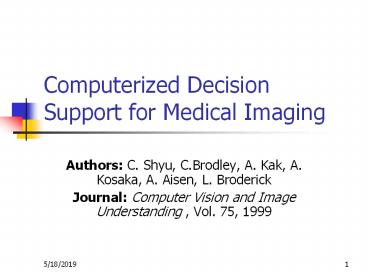Computerized Decision Support for Medical Imaging - PowerPoint PPT Presentation
Title:
Computerized Decision Support for Medical Imaging
Description:
Computerized Decision Support for Medical Imaging Authors: C. Shyu, C.Brodley, A. Kak, A. Kosaka, A. Aisen, L. Broderick – PowerPoint PPT presentation
Number of Views:68
Avg rating:3.0/5.0
Title: Computerized Decision Support for Medical Imaging
1
Computerized Decision Support for Medical Imaging
- Authors C. Shyu, C.Brodley, A. Kak, A. Kosaka,
A. Aisen, L. Broderick - Journal Computer Vision and Image Understanding
, Vol. 75, 1999
2
Computerized decision support systems
- Active knowledge systems which use two or more
items of patient data to generate case-specific
advice. - knowledge systems
- Knowledge source from which the advice is picked
images, algorithms for manipulating the images,
medical data, derived probabilities and symbolic
representation of medical facts - A mechanism by which a user may quickly derive
relevant information from the knowledge source
3
Computerized decision support systems
- General criteria four successful decision support
systems - Need for a decision aid
- Ex when the interpretation requires specialist
expertise, when many images are generated or
interpretation is specially difficult because of
noise or because the image is visually
complicated - Practicality
- the constraints of the medical domain and the
clinical setting should be taken into account
4
Computerized decision support systems
- General criteria four successful decision support
systems (cont.) - Veracity
- The knowledge source on which the decision
support is based must be accurate and complete - Relevance
- The system provides the user with information
which improves his/her decision making.
5
Computer aids for diagnostic radiology
- Image databases
- Decision support systems based on numerical
methods - Use of Bayes rule to combine, for example,
information about the frequency of a disease and
the frequency with which signs are associated
with that disease - Expert Systems
- they are based on a set of rules which represent
the knowledge used by clinicians in making
decisions. The rules are used together with
information provided by the user to generate
inferences.
6
Architecture of a medical imaging expert system
7
Applications of the Imaging Expert Systems
- Automatic generation of anatomical and functional
atlases - CBIR
- The Imaging expert systems should improve the
diagnostic accuracy by providing a second
opinion they should provide objective measures
or normal and abnormal patterns and dray the
attention of radiologists
8
Computer Vision in Medicine
- Automatic detection of clustered
micro-calcifications on mammograms - Computerized detection of pulmonary nodules
- Computerized analysis of heart size
- Characterization of interstitial disease on chest
radiographs - Automatic tracking of vessels on angiographic
images
9
Computer Vision in Medicine
- Low-level features were extracted for the
different applications, but they were limited to
a certain disease, or organ or pathology - Therefore, the low-level feature extractors
should be combined and included in future imaging
expert systems. - Multiplying the inputs increases the quantity of
information the expert system can use to support
diagnosis hypothesis. - Spatial relationships between features
10
Future trends in Medical Imaging
- A new framework for a natural and systematic way
of gathering knowledge from domain experts. - Integration of the IES into the PACS systems.
- Some preliminary results for digital mammography.
- New standards to measure the accuracy of the IES
- Subjective assessment of radiologists is often
the only reference available
11
Future trends in Medical Imaging
- Future applications from pure diagnostic purpose
to therapeutic management - Taking into account the reaction of the patient
to a certain therapy will provide information
for supporting or refining the diagnostic
hypothesis. - T-HELPER
- Medical training
- Quick medical reference ---electronic textbook of
medicine - INTERNIST-1
12
Computerized decision support in diagnostic
radiology
- What is an expert system?
- A computer system that is programmed to imitate
the problem-solving procedures that a human
expert makes. For example, in a medical system
the user might enter data like the patient's
symptoms, lab reports, etc., and derive from the
computer a possible diagnosis. The success of an
expert system depends on the quality of the data
provided to the computer, and the rules the
computer has been programmed with for making
deductions from that data. (High-Tech
Dictionary)































